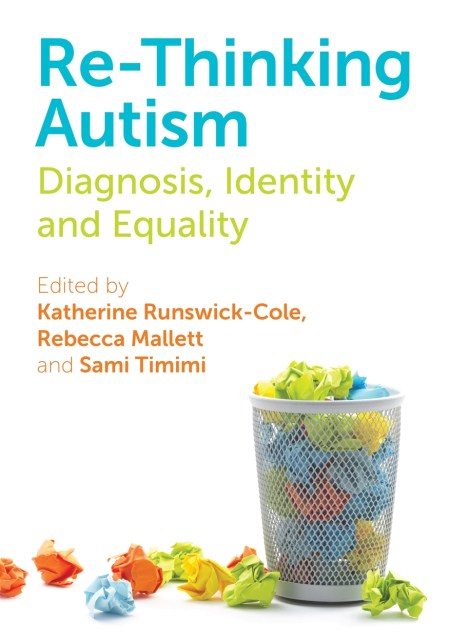Re-Thinking Autism
On sale
5th May 2016
Price: £24.99
Challenging existing approaches to autism that limit, and sometimes damage, the individuals who attract and receive the label, this book questions the lazy prejudices and assumptions that can surround autism as a diagnosis in the 21st Century.
Arguing that autism can only be understood through examining ‘it’ as a socially or culturally produced phenomenon, the authors offer a critique of the medical model that has produced a perpetually marginalising approach to autism, and explain the contradictions and difficulties inherent in existing attitudes. They examine and dispute the scientific validity of diagnosis and ‘treatment’, asking whether autism actually exists at the biological level, and question the value of diagnosis in the lives of those labelled with autism. The book recognises that there are no easy answers but encourages engagement with these essential questions, and looks towards service provision and practice that moves beyond a reliance on all-encompassing labels.
This unique contribution to the growing field of critical autism studies brings together authors from clinical psychiatry, clinical and community psychology, social sciences, disability studies, education and cultural studies, as well as those with personal experiences of autism. It is essential and challenging reading for anyone with a personal, professional or academic interest in ‘autism’.
Arguing that autism can only be understood through examining ‘it’ as a socially or culturally produced phenomenon, the authors offer a critique of the medical model that has produced a perpetually marginalising approach to autism, and explain the contradictions and difficulties inherent in existing attitudes. They examine and dispute the scientific validity of diagnosis and ‘treatment’, asking whether autism actually exists at the biological level, and question the value of diagnosis in the lives of those labelled with autism. The book recognises that there are no easy answers but encourages engagement with these essential questions, and looks towards service provision and practice that moves beyond a reliance on all-encompassing labels.
This unique contribution to the growing field of critical autism studies brings together authors from clinical psychiatry, clinical and community psychology, social sciences, disability studies, education and cultural studies, as well as those with personal experiences of autism. It is essential and challenging reading for anyone with a personal, professional or academic interest in ‘autism’.
Newsletter Signup
By clicking ‘Sign Up,’ I acknowledge that I have read and agree to Hachette Book Group’s Privacy Policy and Terms of Use
Reviews
Impressive! This book inaugurates both Critical Autism Studies and a crucial unsettling of all previous accounts of the meaning of autism. In chapters that unpack the label, its diagnosis and use, autism treatments, politics, identities, Re-Thinking Autism vibrantly demonstrates that it is time to begin our lives with autism as an integral part of human life rather than treating it as an unnatural condition. This book is an antidote to the normative violence that regularly surrounds lives lived with the label of autism, inviting all people to affirm a more complex version of humanity.
The authors and editors of Re-Thinking Autism wear their radical hearts on their sleeves. They promise to thoroughly deconstruct the conventional wisdom about this new "epidemic" in our midst, and, by the book's end, to have prompted readers to think anew about what could be done to help those who struggle in ways that lead to this diagnosis. Their writing is clear, their manner authoritative, and they succeed admirably in achieving their goal.
This three part volume has something for everyone - parents of children with autism, practitioners... researchers and academics... [The] assemblage of disciplinary perspectives and geographic locations provides important insights into the scope and depth of how researchers are thinking about autism through a critical lens... this volume brings much needed attention to alternative ways of knowing autism and critiques of the social construction of autism in relation to what it means to be 'normal' and 'human'.

